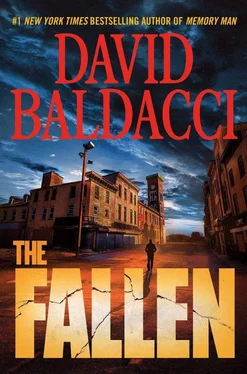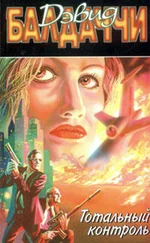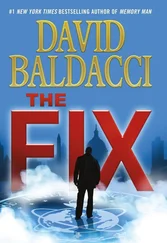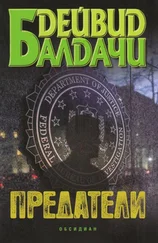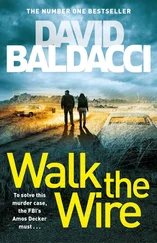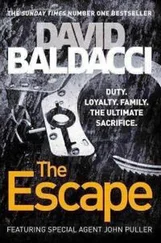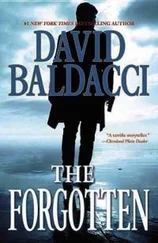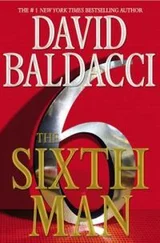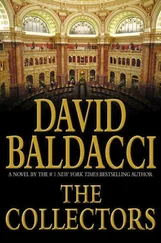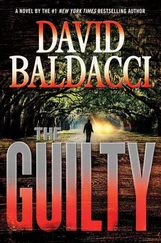Decker continued to look around the space. The smell of mildew was fierce in here. Two of the walls were blackened with what looked like mold or fungus. Another wall had heavy smears of white, which mirrored those on the outside. The ceiling was blotched and stained with water damage.
He moved forward and bumped his leg against one crypt that jutted out into the main space.
Rubbing his thigh, he looked down at the etched name on the marble.
Abigail Baron .
Baron noted what Decker was looking at and said, “The man obviously wanted his eternal life all to himself, with even his wife shunted off to the side.” He looked around. “It’s full now, so no more admissions are possible. My spot is outside.”
“I can see why you wanted to get out of here when you were little,” said Jamison, slowly looking around. “I mean, it’s all about... death.”
Baron led them back outside and locked the door.
Jamison stepped off to one side of the mausoleum and inspected what looked to be the newest graves on the grounds, though from the dates on the tombstones they were over thirty years old.
“Are these your parents?” she asked.
Baron slowly turned from the mausoleum and looked at the twin tombstones.
“My father, Benjamin, and my mother, Dorothy. Dearly departed, as they say.”
Decker walked over and read the information on the grave markers. “They were only in their forties. And they died on the same day. What happened?”
“Not really sure,” said Baron as he joined them.
Decker and Jamison stared at him. “What do you mean?” Decker asked. “You should know how they died.”
“There are certain people who believe they died in an accident. And there are certain people who believe they committed suicide.”
“Which one do you believe?” asked Jamison.
“Neither.”
“So how do you think they died?” she said.
He looked directly at her. “I think they were murdered.”
“Those are three very different possibilities,” said a clearly surprised Jamison.
“Yes, they are.”
“Why do you think they were murdered?” asked Decker.
“Let’s take a walk. There’s a large pond on the grounds. And while their blooming period is long over, the foliage of the rhododendrons is still quite lovely,” he added in a somber tone.
Baron led them down a well-worn path through stands of trees. Farther down he turned right.
“The grounds used to encompass the land all the way to the bottom where you reach the road heading into town,” he explained. “But the property was sold off over the years. There’s not much left, but what is, I think, are the prettiest parts.”
He led them out of the woods and past a long column of rhododendrons to a large pond whose surface was half covered with vegetation. The ground sloped down toward it on all sides.
“I would come here as a child,” said Baron, gazing at the water as they neared the edge. “We could never swim in it. You see the plant growth? The vines reach all the way to the bottom. You can easily become entangled. Indeed, one of my ancestors nearly drowned in there. Ever since then we would only come down to admire it. Or take a little rowboat across to the other side. It’s quite deep in the center. And it used to have fish stocked, but that was a long time ago.”
“And your parents?” prompted Jamison.
“My parents died in there,” he said simply.
“But you just said no one went swimming in there.”
“They weren’t swimming. They were in their car.”
Decker said, “How did a car get here?”
“Back then there was a road leading from the house to here. A long time ago my great-grandfather had it put in. That was when money was more plentiful. They would drive their cars here and picnic. They’d spend the whole day here, I was told. When I was a child, I remember my father bringing me and my mother down here, though we never had the luxury of an all-day picnic. But it was still very nice. Some of my happiest times here were with my parents.”
He sat down cross-legged on the grass. Decker and Jamison remained standing.
“Now I come here sometimes just to think. And look at the water. And drink,” Baron added. “I was in college at the time, just beginning my second year, when I got a call from the police. They had found my parents in their car at the bottom of the pond. They were quite dead, of course.”
“My God,” said Jamison.
Baron looked up at her. “I doubt God had anything to do with it.” He glanced back at the water.
“What did the police say at the time?” asked Decker.
“They were convinced it was either an accident or, more likely, some sort of suicide pact. Even back then we were paupers, though I didn’t know it. My parents were feeling the strain of keeping up the Baron image without the financial resources to do so. You see the house the way it is now. Back then it was better and we could still afford help both in the house and with the grounds, but it was difficult. My father was a good man. He could see the handwriting on the wall. He went to college and law school. He made a good living as an attorney, but it wasn’t nearly enough to maintain all that the Barons had accumulated. My mother brought some money to the marriage, but it wasn’t enough either.”
“So why not sell the house and grounds and move?” asked Jamison.
“Even back then the house was crushed under a mortgage, which really made it unmarketable. And there were tax bills and other debts, all of which accumulated interest. It seemed like the harder my father worked to pay them off, the faster the debts grew. He kept going, but he ended up robbing Peter to pay Paul. I know they were thrilled when I received a baseball scholarship to college.”
“He could have declared bankruptcy,” suggested Decker.
“To him it was a matter of honor. He was not going to walk away from it.”
“So he might have felt desperate,” observed Jamison.
Baron abruptly stood. “Not desperate enough to kill himself. And even if he had come to that decision, he certainly would never have suggested that my mother join him in the hereafter.” He paused. “I would like to think that the subject of their only child might have come into any such decision-making process, and that my parents would not have wanted to leave me all alone.”
“Could it have been an accident, then?” said Jamison.
“I don’t see how. You couldn’t accidentally drive your car into the pond. It had to have been deliberate.”
“But you think it was deliberate murder ?” said Decker. “Did your parents have enemies?”
“They had enemies simply by being Barons.”
“What did the police conclude?”
“I’m not sure they ever officially concluded anything. They did tell me that they suspected my parents had died either accidentally, or intentionally by their own hand. But no suicide note could be found.”
Decker nodded. “Could they have been incapacitated first and then placed in the car? With the slope, all someone would have to do was put the car in neutral and it would roll right into the water.”
“I asked the police that.”
“And what did they say?”
“That it was still an ongoing investigation and they couldn’t provide those details.”
“And when the investigation no longer was ongoing?” asked Jamison.
“Apparently it still is, because the police never released a definitive finding one way or another. And they still won’t answer any of my questions.”
“You still ask?” said Jamison.
“About once or twice a year. I used to write letters or make phone calls. Now I do it by email directly to the police commissioner.”
“And does the commissioner answer you?”
Читать дальше
